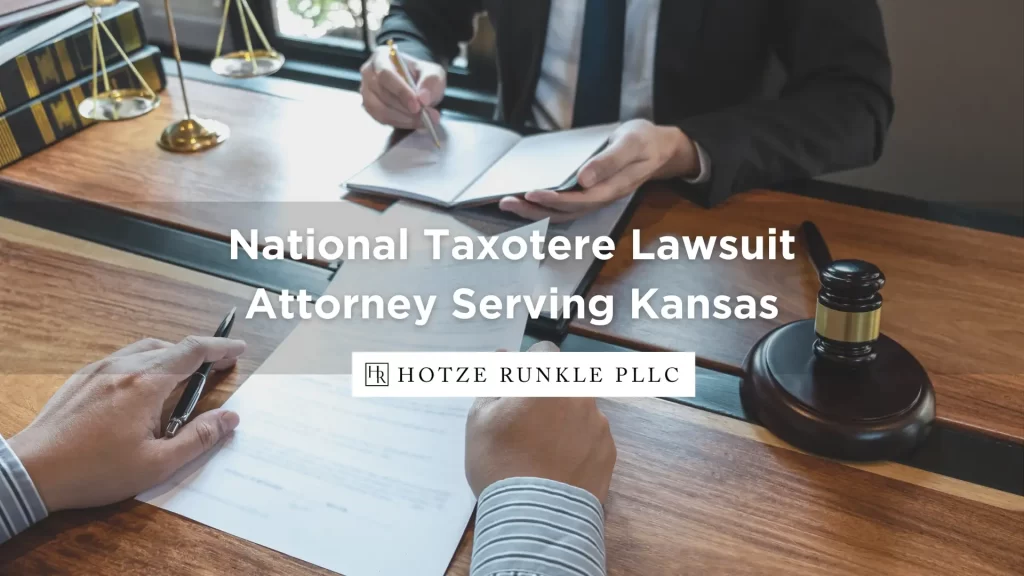
Are you a Kansas resident who took the chemotherapy drug, Taxotere (docetaxel)? Did you develop severe side effects, such as watery eyes or constant tearing? You may be entitled to significant compensation.
The chemotherapy drug Taxotere, also known as docetaxel, has been linked to a serious ocular condition called canalicular stenosis, which is when the opening of the tear duct system has narrowed. If you completed your Taxotere regimen and you still experience epiphora (excessive eye-watering), then you may have developed canalicular stenosis.
Canalicular stenosis can become a permanent condition, only treatable with a costly surgery that may require long-term upkeep. Patients who developed this condition after receiving Taxotere treatment have a right to demand financial compensation. Compensation can cover the cost of related treatment for canalicular stenosis and the impact on your quality of life resulting from this dangerous chemotherapy drug.
The defective drug attorneys of Hotze Runkle PLLC have helped many people throughout Kansas secure the financial compensation they deserve. Take this quiz today to see if you have a valid case against the manufacturers of Taxotere. If you decide to file a lawsuit, our legal team will be ready to act on your behalf.
What Is Taxotere?
Taxotere is the brand name of docetaxel, which is a chemotherapy drug administered intravenously. It is manufactured by a pharmaceutical company called Sanofi-Aventis.
This drug is commonly used to treat breast cancer, but it is also used for patients suffering from lung cancer, prostate cancer, stomach cancer, and head or neck cancer. It works by attacking cancer cells and changing their supporting structure so they will no longer grow.
Taxotere is often administered on a weekly basis for those undergoing chemotherapy. Depending on the patient’s needs, it can also be administered every two weeks or three weeks.
Symptoms of Canalicular Stenosis
The lacrimal gland plays an important role in protecting your eyes from dirt and debris. It does so by producing tears throughout the day, which helps lubricate the cornea. The tears pass through the canaliculus into the tear duct.
When canalicular stenosis occurs, which is a narrowing of the small channels that lead to the tear ducts, tears flow down the face instead. Stenosis can affect the lower canaliculus, the upper canaliculus, or both.
Symptoms of canalicular stenosis include:
- Unexplained eye-watering
- Excessive overflow of tears, also called epiphora
- Blurred vision due to excessive tears
- Eyelid swelling
- Eye irritation from frequent tissue use
The extent of narrowing determines the severity of the condition. When caught early, moderate cases of canalicular stenosis can usually be reversed. Severe cases of stenosis cause permanent harm to the canalicular system.
The Link Between Taxotere and Canalicular Stenosis
Medical research suggests that canalicular stenosis can be caused by Taxotere treatment. In a study of nearly 150 patients who were treated with docetaxel therapy, it was concluded that canalicular duct obstruction was a common side effect for those who received weekly docetaxel treatment, and it could additionally be a side effect for those who took Taxotere less often, such as every two or three weeks. Shockingly, 30 of the studied patients eventually underwent surgery to treat excessive eye-watering. Surgical treatment included the placement of temporary silicone tubes and permanent glass tubes.
One of the most important findings from this study was that early treatment can prevent further narrowing of the ducts, and it can prevent the need for more involved surgical treatment, such as placement of permanent glass tubes.
In another study, researchers found that three breast cancer patients developed excessive eye-watering and canalicular stenosis shortly after beginning weekly docetaxel treatment. For most of these patients, their symptoms did not go away, even months after stopping docetaxel treatment. This suggests that Taxotere/docetaxel can cause irreversible harm.
The researchers in this study also highlighted the importance of early intervention. They indicated that patients receiving docetaxel treatment should be regularly screened for epiphora and canalicular stenosis. If epiphora and similar symptoms are noticed, then silicone tubes should be temporarily placed to prevent more invasive treatments.
While it’s clear that there is a link between canalicular stenosis and Taxotere/docetaxel, the question is: How exactly does Taxotere cause eye problems?
Research is still ongoing, but it appears that docetaxel causes the canaliculi to be chronically inflamed. A study investigated how Taxotere causes canalicular stenosis, and it’s believed that the drug is secreted in the tear film, resulting in inflammation as the tears pass through the canaliculi. This chronic inflammation results in scarring, and eventually, narrowing of the ducts.
Who Is Liable in a Taxotere/Docetaxel Lawsuit?
When under a doctor’s care, you rely on them to properly monitor your side effects and treat conditions in a timely manner. If your symptoms are overlooked, irreversible harm can occur. And when it comes to canalicular stenosis, early intervention is critical. Early treatment may reverse canalicular stenosis to some degree, and prevent the need for surgery that requires long-term upkeep.
Unfortunately, doctors must also rely on drug manufacturers to properly warn them about potentially dangerous side effects. Drug manufacturers, such as Sanofi-Aventis, should rigorously test their products to identify potentially harmful effects. If certain drugs are found to be dangerous or defective, they shouldn’t be released to the public. Likewise, if actively used drugs are discovered to cause serious side effects, the public has a right to know.
Sanofi-Aventis has not done enough to warn consumers and doctors about the long-term effects of Taxotere. Many oncologists, ophthalmologists, and other healthcare professionals were not aware that Taxotere was causing irreversible damage to their patient’s eyes.
If it’s discovered that your canalicular stenosis was caused by Sanofi-Aventis’ negligence, then you have a right to demand financial compensation from them. The attorneys at Hotze Runkle PLLC have been actively pursuing litigation against Sanofi-Aventis on behalf of victims just like you.
Recovering Compensation for Your Kansas Chemo Eye Lawsuit
If you’re a Kansas resident who developed eye problems after Taxotere/docetaxel treatment, you might be wondering how much compensation you can recover. This depends on your extent of harm, also known as “damages.”
In the state of Kansas, people harmed due to defective or dangerous drugs are entitled to compensation for economic damages and non-economic damages.
If you secure a settlement or verdict, you may be compensated for:
- The Cost of Surgery: Treatment for canalicular stenosis includes the temporary placement of silicone tubes to salvage the canalicular system. If the condition is severe, permanent glass tubes must be placed.
- Ongoing and Future Medical Care: Once canalicular stenosis has progressed, it often requires long-term monitoring and care. This is especially true for patients who had permanent glass tubes placed in their canalicular system. There is a slight chance that the tubes will migrate or be rejected by the body. Regular monitoring is needed to mitigate these risks.
- Lost Income: Excessive tearing is the primary symptom of canalicular stenosis. This can cause blurry vision and eye irritation, which is devastating for those who operate heavy machinery for a living, review documents, or rely heavily on their vision throughout the workday. If you have an advanced case of canalicular stenosis, you may have to stop working entirely.
- Pain and Suffering: A diagnosis of canalicular stenosis can mean a lifetime of difficulties, causing pain and suffering, mental anguish, and other psychological distress. In the state of Kansas, the court considers this to be an important part of your overall compensation.
If you decide to file a lawsuit, your attorney will document any costs you’ve incurred related to your required treatments, ongoing medical care, resultant lost income, and more. The goal of financial compensation is to ensure you’re fully paid back for the harm you’ve endured.
How the Kansas Attorneys of Hotze Runkle PLLC Can Help
 [Firm-name] has provided trusted legal counsel for people throughout Kansas who have been harmed by dangerous drugs. When you choose our law firm to handle your Taxotere lawsuit, you can expect:
[Firm-name] has provided trusted legal counsel for people throughout Kansas who have been harmed by dangerous drugs. When you choose our law firm to handle your Taxotere lawsuit, you can expect:
- A Thorough Investigation: Pursuing compensation on your own is insurmountable, especially for complex defective drug cases. If you choose to take legal action, we’ll use all resources necessary to investigate how you were harmed by Taxotere, and identify the extent of your injuries.
- Access to Top-Notch Experts: Developing canalicular stenosis isn’t enough to prove fault in a defective drug lawsuit. We’ll hire top-notch experts to strengthen your case and testify on your behalf, if needed.
- An Aggressive Legal Strategy: Our law firm has a proven track record of success when taking on large pharmaceutical companies. Our number one goal is to ensure you’re fairly compensated for the harm you’ve endured.
Are You Eligible to Take Legal Action?
Are you a current or former chemotherapy patient? If so, did you undergo chemotherapy treatment with Taxotere/docetaxel? Since you started treatment, have you developed troubling side effects, such as excessive eye-watering?
You may be eligible to file a lawsuit against Sanofi-Aventis, whether you received Taxotere weekly or you had another treatment regimen. Take our case evaluation quiz here to see if you might have a valid claim. Once you’re ready to take the next step, our caring legal team will be ready to meet with you to discuss your options.